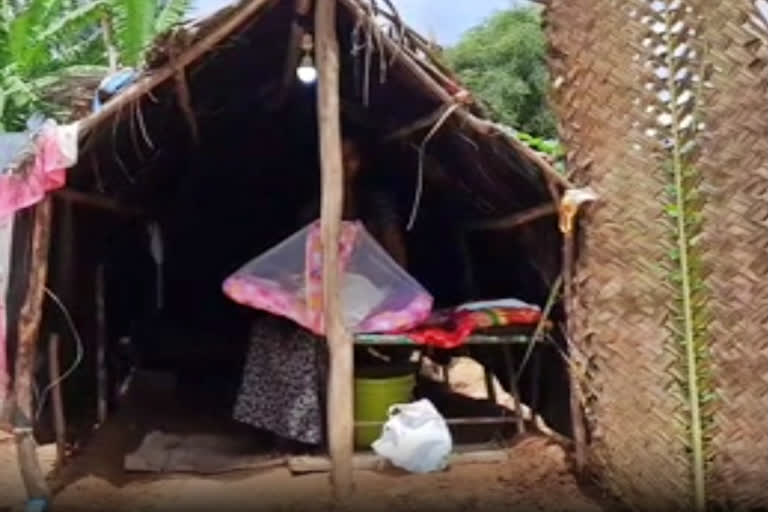Anantapur: GG Hatti is a small village in the Rolla Mandal of the Anantapur district of Andhra Pradesh. People in this village are still living in the primitive era. Even in 2021, the rural areas have myths and taboos embedded within them. This village is the living proof that women are considered impure when they are menstruating. There are about 150 people living in the village. Half of that population are women.
However, ancient customs are still practised in this modern age in the village. Discrimination against women continues to prevail in GG Hatti. Women are not allowed to stay at home during menstruation and after giving birth.
When the girls are on their menstruation they are drove out of their houses. The women are forced to live in a community hall for three days which is constructed out of the village. They are not allowed to enter the temple as they are considered unholy when their monthly cycles are on. Those few days they become untouchables and treated in a very harsh way.
Also Read: Sanitary Products Can Be Convenient and Comfortable Too!
Various studies show that women tend to contract urinary infections if they do not maintain proper hygiene. Also, they tend to require fruits and a properly balanced diet during these days. The government launched the National Menstrual Hygiene Scheme under the 'Rashtriya Kishor Swasthya Karyakram' programme in 2014. The objective of the scheme was to promote menstrual hygiene among adolescent girls in rural areas by supplying as well as training self-help groups to make sanitary napkins. Yet as of now, these villages are on the brink of oblivion.
ETV Bharat spoke to local women who said, "We have to stay out of the village during the periods or menstruation. We have to eat what they give. We should not touch anything. It is difficult to follow things like this but we follow that it is for our own sake. This is our village custom."
Mother of a new-born told ETV, "Being a mother is a blessing in every woman's life. Everyone considers it as the sweetest feeling in their lives. But in GG Hatti it is worst. After giving birth to the baby both the new-born and the mother are not allowed to enter the premises of the village. As the villagers would not allow them into the house. In spite of being in a delicate condition, they have to stay in a hut outside the house."
Echoing the same words another woman said, "After giving birth, the baby and the mother will stay in a hut set up outside the house for three months. At night, someone may stay outside the hut but will not get in and will not even touch the baby. It becomes very difficult. After spending 2-3 months in the hut the baby and the mother are allowed into the house. They first go to the temple and perform special prayers. Several attempts have been made by the authorities and many others to eradicate such customs in the nearby seven villages, including GG Hatti, were futile."
An 18-year-old said, "I was born in this village. Our mother suffered the problems in the same way. Girls have to stay out of the village for at three to five days when they reach adulthood. The mother and the baby are compelled to stay out of the village during menstruation and also after childbirth. It's this village's custom."
Also Read: World Menstrual Hygiene Day 2021#MHDay
Menstrual Hygiene Day, which is observed on May 28, aims to break the silence and build awareness about the fundamental role that good menstrual hygiene management (MHM) plays in enabling women and girls to reach their full potential. Menstruation is still a taboo in India and it is common for people across society to feel uncomfortable about the subject.
Menstrual practices are influenced by taboos and socio-cultural restrictions for women as well as adolescent girls. The lack of access to menstrual hygiene (which includes sanitary napkins, toilets in schools/households, availability of water, privacy and safe disposal) could restrict school attendance, social mobility and contribute to local infections during this period. Therefore, creating awareness, educating society and increasing access to the requisite sanitary infrastructure related to menstrual hygiene is important. Even films like Padman acted by Akshay Kumar couldn't imprint their minds with education regarding menstruation.



